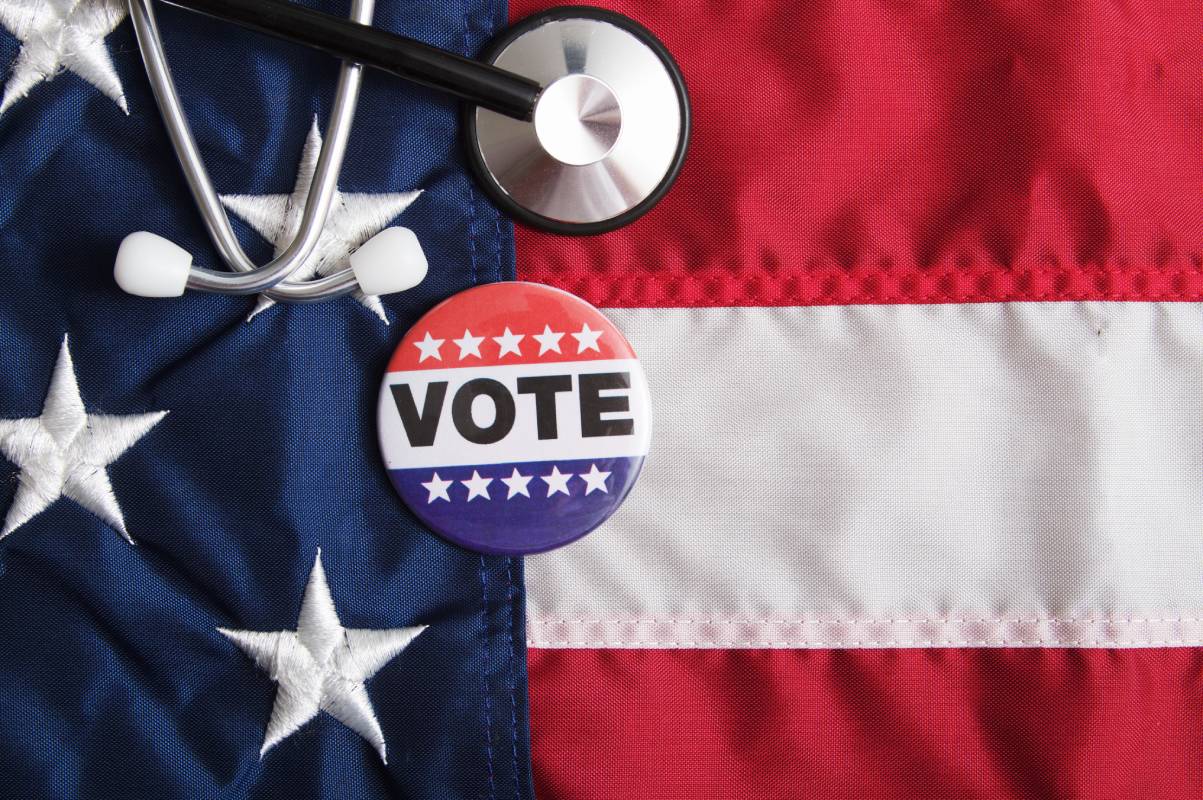
In the midst of political turmoil, an impending economic recession, and the COVID-19 pandemic, the 2022 midterm elections reflected this unprecedented era of American history, with major implications for health and healthcare policy. Although voters were divided by party, questions around health remained an important factor, with 51% of Democrats and 27% of Republicans reporting that they prioritized healthcare in deciding their vote (1). In the Senate, Democrats maintained the majority, but Republicans gained the majority of the House, resulting in a gridlocked political system and unclear consequences (2). For everyday Americans, the expected health impacts of the midterm elections are most prominent in three categories: COVID-19, abortion, and healthcare costs.
First, despite President Biden warning that COVID-19 could infect 100 million Americans this winter (3), many pandemic policies and precautions were or are being discontinued throughout the country. COVID-19 remains a heavily partisan issue, with Democrats supporting the presidential administration’s request to Congress for additional COVID-19 funds (2). Meanwhile, many Republicans view pandemic precautions such as mask mandates as an affront to Constitutional rights, promising to eliminate them in campaign ads. Most politicians have stopped talking about preventing the spread of COVID-19 and instead have begun promising loosening restrictions (2). This shift reflects the changing societal perception of the pandemic, with a recent poll reporting that 44% of Americans want to “move on” from the pandemic, though only 39% believed that the pandemic is “over” (4). While this transition may result in loosened restrictions and higher-than-expected rates of COVID-19, it’s good news for government spending, as reducing COVID-19 funding may help protect the government from a recession.
Second, on the heels of the decision to overturn Roe v. Wade, abortion emerged as another hot topic related to health for the 2022 midterm elections. Approximately 56% of registered voters ranked abortion as a significant deciding factor in the vote (5). In response to the Supreme Court decision, 60% of voters reported feeling “dissatisfied” or “angry” (6). As a result, pro-choice ballot measures won in several states, including historically Republican states such as Kentucky and Montana (7). Access to abortion was added to several state constitutions (8). However, politicians with anti-abortion stances also won by large margins in several states, such as Texas governor Greg Abbott and Floridian governor Ron DeSantis (7). While the midterm elections secured access to abortion in several states, other states enacted measures to limit or eliminate access, even in extreme circumstances.
Third, economic factors weighed heavily on voters’ minds. Inflation ranked as the top issue for voters, while 55% of voters also ranked prescription drug costs as “very important” in deciding their votes (9). Costs for medications have skyrocketed in recent years, with Americans paying two to three times what citizens in other countries pay for the same medications (10).
Pushed by Senate Democrats and signed by President Biden in 2022, the Inflation Reduction Act promised to reduce prescription drug costs and insurance costs, but projections estimate that portions of this policy could be targeted by the incoming Republican majority in the House (11).
In summary, current American societal problems related to health clearly impacted voters’ decisions in the 2022 midterm elections, but enacted policies and elected officials may not offer many solutions. Healthcare costs will potentially be reduced across the country, but COVID-19 and abortion policies continue to remain heterogeneous by state. While the actions of a Republican House and a Democrat Senate remain unclear with an economic recession on the horizon, for now, access to abortion has been protected in several states and health care costs have been decreased.
References
1: Smith-Schoenwalder, C. 2022. “How COVID-19 Will Shape the 2022 Midterm Elections.” US News. URL: https://www.usnews.com/news/elections/articles/the-coronavirus-and-the-2022-elections
2: Mangan, D., Kimball, S. and Wilkie, C. 2022. “Live updates — midterm elections.” CNBC. URL: https://www.cnbc.com/2022/11/09/live-updates-of-2022-midterm-election-day.html
3: Smith-Schoenwalder, C. 2022. “Is a fall COVID-19 surge coming to the US?” US News. URL: https://www.usnews.com/news/the-report/articles/2022-09-02/is-a-fall-covid-19-surge-coming-to-the-u-s.
4: Jackson, C., Newall, M., Duran, J. and Golden, J. 2022. “Most Americans not worrying about COVID going into 2022 holidays.” Ipsos. URL: https://www.ipsos.com/en-us/news-polls/axios-ipsos-coronavirus-index.
5: Pew Research Center. 2022. “Midterm voting intentions are divided, economic gloom persists.” Pew Research Center. URL: https://www.pewresearch.org/politics/2022/10/20/midterm-voting-intentions-are-divided-economic-gloom-persists/.
6: Ollstein, A. and Messerly, M. 2022. “A predicted ‘red wave’ crashed into wall of abortion rights support on Tuesday.” Politico. URL: https://www.politico.com/news/2022/11/09/abortion-votes-2022-election-results-00065983.
7: Kurtzleben, D. 2022. “What we know (and don’t know) about how abortion affected the midterms.” National Public Radio. URL: https://www.npr.org/2022/11/25/1139040227/abortion-midterm-elections-2022-republicans-democrats-roe-dobbs.
8: Nash, E. and Guarnieri, I. 2022. “In the US midterm elections, resounding victories for abortion on state ballot measures.” Guttmacher Institute. URL: https://www.guttmacher.org/2022/11/us-midterm-elections-resounding-victories-abortion-state-ballot-measures.
9: Kirzinger, A., Schumacher, S., Quasem, M., Stokes, M. and Brodie, M. 2022. “KFF health tracking poll July 2022: inflation tops voters’ priorities, but abortion access resonates for key voting blocs.” Kaiser Family Foundation. URL: https://www.kff.org/womens-health-policy/poll-finding/kff-health-tracking-poll-july-2022/.
10: The White House. 2022. “By the numbers: the Inflation Reduction Act.” The White House Briefing Room. URL: https://www.whitehouse.gov/briefing-room/statements-releases/2022/08/15/by-the-numbers-the-inflation-reduction-act/.
11: Dillon, J. and Sobczyk, N. 2022. “GOP fumes over climate law. Is there a will for repeal?” E & E News. URL: https://www.eenews.net/articles/gop-fumes-over-climate-law-is-there-a-will-for-repeal/.

